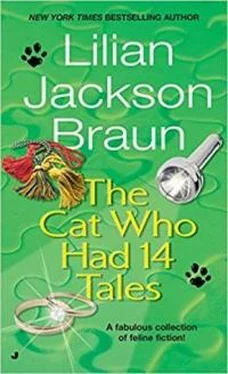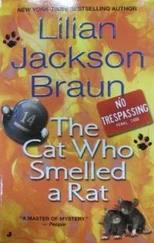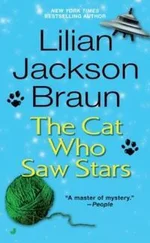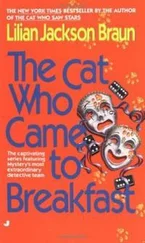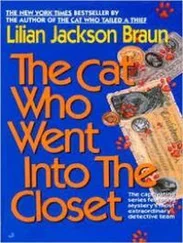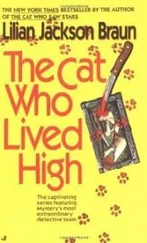The main course was the kind of simple provincial dish the Hopples approved: a medley of white beans, lamb, pork ribs, homemade sausages, herbs, and a little potted pheasant. Their cook, imported from the French wine country, would have nothing to do with microwave ovens or food processors, so they had built a primitive kitchen with a walk-in fireplace to keep Suzette happy. The cassoulet that was now served had been simmering in the brick oven all day. With it came a change of subject matter, and the meal ended without further reference to Whiskers.
After dinner Donald performed his regular chore of feeding the Gang—taking their dinner tray upstairs in the glass-enclosed elevator, rinsing their antique silver drinking bowl (attributed to Paul Revere), and filling it with bottled water. Meanwhile his parents were served their coffee in the library.
“You were right about the boy,” Mr. Hopple remarked. “His imagination runs away with him.”
His wife said: “Donald’s story is probably an elaboration on an actual occurrence. No doubt the cat is a stray, perhaps the runt of a litter, unwanted, and thrown out of a passing car.”
“You have an explanation for everything, sweetheart. And you are so efficient. Did you make any plans for the weekend?”
“No, darling. I knew you’d be coping with jet lag. But I invited the gardener’s grandchildren to have lunch with Donald. They’re his own age, and he needs to meet town children occasionally.”
On Saturdays the Hopples usually breakfasted in festive style in the conservatory, but both maids were suffering from morning sickness the next day, so the family trooped into the kitchen. There they sat at an ancient wooden table from a French monastery, under a canopy of copper pots and drying herbs, while Suzette cooked an omelette in a long-handled copper skillet over an open fire.
After breakfast Donald said: “Mother, can I take some of the Gang’s catfood to the kittens in the stable?”
“May I, darling,” she corrected softly. “Yes, you may, but ask yourself if it’s advisable to spoil them. After all, they’re only barn cats.”
“Two of the kittens are very smart, Mother. They’re as smart as the Siamese.”
“All right, Donald. I value your opinion.” After he had scampered away, Mrs. Hopple said to her husband: “See? The Whiskers story was only a fantasy. He’s forgotten about it already . . . . By the way, don’t forget to ask Bobbie about the bonfire, dear.”
Her husband thanked her for the reminder and went to buzz the stable on the intercom. “Good morning, Bobbie. This is Hopple speaking. We haven’t met as yet, but I’ve heard good reports of you.”
“Thank you, sir.”
“Since you live near the south gate, I’m wondering if you’ve observed any trespassing in the meadow. Someone had a bonfire there, and that’s bad business.”
“No, sir. Never saw anything like that,” the new stableboy said, “but I’ve been away for three days at a science conference, you know.”
“If you notice any unauthorized activity, please telephone us immediately—any hour of the day or evening.”
“Sure thing,” said Bobbie.
“One more question: Have you seen any . . . unusual cats in the stable or on the grounds?”
“Only a bunch of kittens and an old mother cat.”
“No strange-looking stray with long whiskers?”
There was a pause, and then the young man said: “No, I only heard some funny noises—like a duck quacking, and then some kind of electronic beep. I couldn’t figure where it came from.”
“Thank you, Bobbie. Keep up the good work.”
Mr. Hopple flicked off the intercom and said to his wife: “Donald is making those ridiculous noises in the stable. How long should we allow this to go on before consulting the doctor?”
“Darling, he’s just playing games. He’ll grow out of it soon. It’s common for young children to invent imaginary friends and have conversations with them.”
“I can assure you that I never did,” said her husband, and he went to his study, asking not to be disturbed.
Before noon the houseman took the Mercedes into town to pick up the Bunsen twins, a boy and a girl. Mrs. Hopple welcomed them warmly and gave them a picnic basket in which the cook had packed food enough for twelve children. “Wear your beeper, Donald darling,” she reminded him. “I’ll let you know when it’s time to bring your guests back.”
Donald drove the twins to the meadow in the pony cart. Having observed his father in social situations, he played the role of host nicely, and the picnic went smoothly. No one fell down. No one picked a fight. No one got sick.
When Mrs. Hopple beeped her son, he drove his guests back to the house with brief detours to the dog kennel, rabbit hutch, chicken coop, and horse stable.
“Did you have a nice time?” Mrs. Hopple asked the excited twins.
“I ate four chocolate things,” said the boy.
“My mother told me to say thank you,” said the girl.
“I saw a snake,” the boy said.
“We saw Whiskers,” the girl said.
“He’s green!”
“No, he’s blue with green whiskers.”
“His eyes light up.”
“Sparks come out of his whiskers.”
“He can fly.”
“Really?” said Donald’s mother. “Did he say anything to you?”
The twins looked at each other. Then the boy quacked like a duck, and the girl said: “Beep beep beep!”
Mrs. Hopple thought: Donald has coached them! Still, the mention of sparks made her uneasy. Living so far from town, the Hopples had an understandable fear of fire. She left the house hurriedly and rode a moped to the stable.
Bobbie was in the corral, exercising the horses. Donald was unhitching the pony. The barn cats were in evidence, but there was no sign of a creature with red-hot whiskers. Her usual buoyant spirit returned, and she laughed at herself for being gullible.
On the way back to the house she overtook the head gardener, laboring arthritically up the hill, carrying a basket of tulips and daffodils. She rebuked him kindly. “Mr. Bunsen, why didn’t you send the flowers up with one of the boys?”
“Gotta keep movin’,” he said, “or the old joints turn to ce —ment.”
“Mr. Hopple is arranging to hire some more help for you.”
“Well, ’twon’t do no good. Nobody wants to do any work these days.”
“By the way, you have two delightful grandchildren, Mr. Bunsen. It was a pleasure to have them visit us.”
“They watch too much TV,” he complained . . . . “Lookit that grass turnin” brown. No rain for ten days! . . . Somethin’ else, too. Some kind of critter’s been gettin’ in the greenhouse. Eats the buds off the geraniums. And now the tractor’s broke. Don’t know what happened. Just conked out this afternoon.”
“You must call the mechanic early Monday morning,” Mrs. Hopple said encouragingly. “Ask for priority service.”
“Well, ’twon’t make no difference. They come when they feel like it.”
The gardener’s grouchy outlook had no effect on Mrs. Hopple, who was always cheerful. Mentally reciting a few lines of Wordsworth, she carried the flowers into the potting shed, a room entirely lined with ceramic tile. There she was selecting vases from a collection of fifty or more when a commotion in the nearby kitchen sent her hurrying to investigate.
Suzette was standing in the fireplace—which was now cold and swept clean—and she was banging pots and pans and screaming up the chimney. From the cook’s raving—three parts English and two parts French—it appeared that a diable up on the toit was trying to get down the cheminée into the cuisine.
Читать дальше
